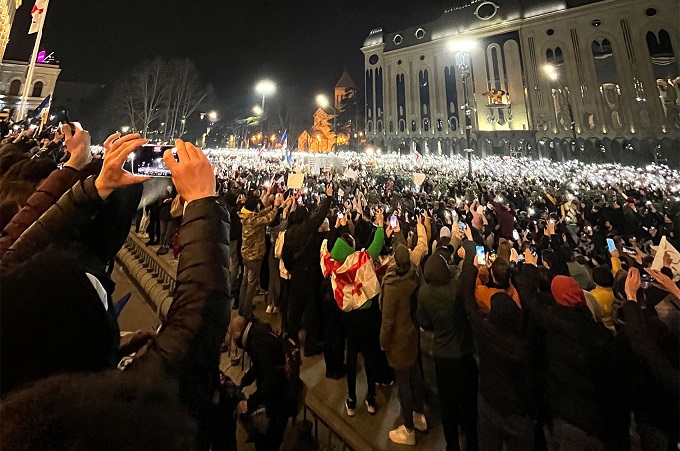By Laura Linderman
As Georgia approaches parliamentary elections in October 2024, the South Caucasus state stands at a pivotal juncture. The growing authoritarian tendencies of the ruling Georgian Dream (GD) party threaten to derail the nation’s democratic progress, and its aspirations for Euro-Atlantic integration. In this critical moment, the United States needs to act decisively by leveraging congressional measures to support Georgia’s democratic institutions and counter authoritarian influences there.

The problem is acute, because GD appears increasingly willing to resort to drastic measures to maintain its grip on power. Recently, the party openly indicated that it would call for a ban on the country’s political opposition if it gains a constitutional majority in the upcoming elections.
Georgia’s ruling party has reason to be concerned. Credible international polling by Edison Research suggests that GD is poised for a significant decline in vote share. Those figures reflect growing discontent among the Georgian populace, likely fueled by the government’s authoritarian measures and its failure to address critical economic and social issues. This contrasts sharply with less credible polling by GORBI, which claims GD is set to achieve an unrealistic majority—numbers that GD has never achieved, even at its height in 2012. The credibility of GORBI’s polling is further undermined by the significant public unrest and mass protests in the wake of the country’s passage of a controversial foreign agent law, which has only intensified public dissatisfaction.
It’s no wonder, then, that GD is contemplating potentially drastic political measures to prop up its authority. But its proposal signals a dangerous erosion of democratic norms, and highlights the need for international scrutiny and action, because the implications are profound – both for Georgia’s internal stability and for its international relationships, particularly with the United States and European Union.
Fortunately, Congressional remedies exist. Both the MEGOBARI Act in the House and the Senate’s Georgian People’s Act represent a bipartisan effort to address recent democratic backsliding in Georgia. They aim to impose financial sanctions on individuals undermining democratic processes and human rights, holding accountable those who threaten Georgia’s democratic future. Cumulatively, this legislation underscores the U.S. commitment to supporting the Georgian people, who overwhelmingly support Georgia’s Euro-Atlantic integration, and to countering malign influences, particularly from Russia. The both Acts’ power lies not only in punitive measures, but also in their potential to influence Georgia’s future trajectory by making it clear that the international community will not tolerate the erosion of democratic values.
The MEGOBARI Act, in particular, provides comprehensive incentives for the U.S. to strengthen Georgia’s democratic institutions based on real progress and reform. These incentives include negotiating a more robust trade agreement, enhancing exchanges and a streamlined visa regime, developing a comprehensive economic and modernization package, providing defense equipment and support, and offering a security assurance framework similar to the Ukraine G7 agreement. These positive incentives are essential to show both the Georgian government and its people that a commitment to democracy and reform will bring tangible benefits.
As Georgia faces the potential for electoral fraud and post-election unrest, this legislation (and its companion in the Senate) offers a critical toolkit for the U.S. to support Georgia’s democratic aspirations. Through them, the U.S. can help ensure a fair electoral process and counter external threats to Georgia’s sovereignty. Ultimately, congressional action should be about empowering Georgians to seize this moment and chart a course toward a more democratic and prosperous future. Washington’s role is to provide the necessary support and tools necessary for Georgia to succeed.
The stakes are high, because the upcoming elections in Georgia represent not just a domestic political contest, but a defining moment for the country’s future. The international community, led by the United States, needs to be vigilant and proactive in ensuring that this future is democratic, prosperous, and aligned with the values that the Georgian people have repeatedly affirmed.
Laura Linderman is Senior Fellow and Program Manager at the Central Asia-Caucasus Institute of the American Foreign Policy Council




